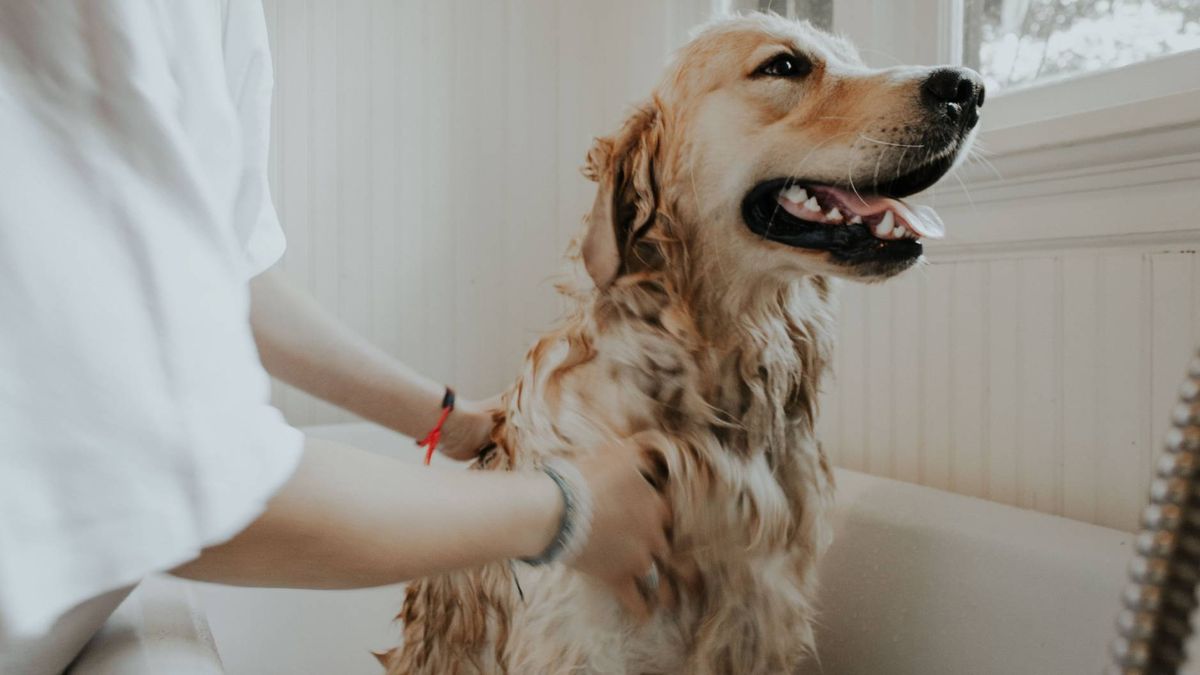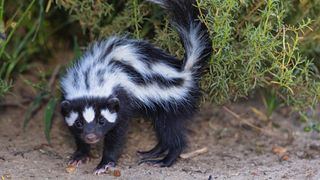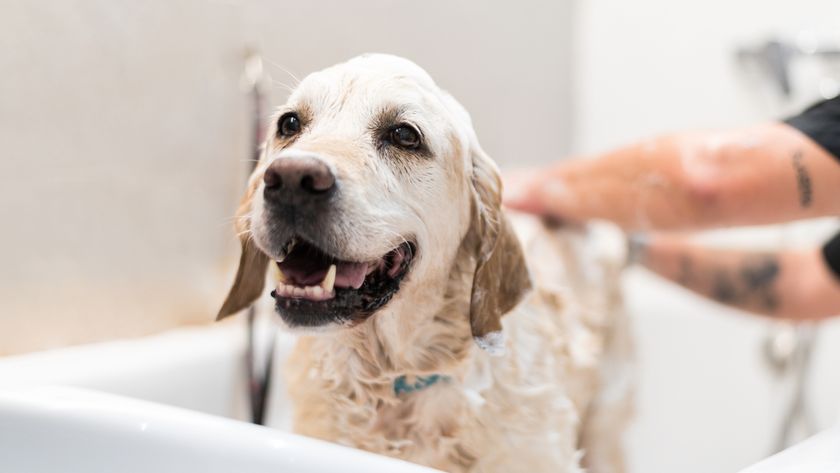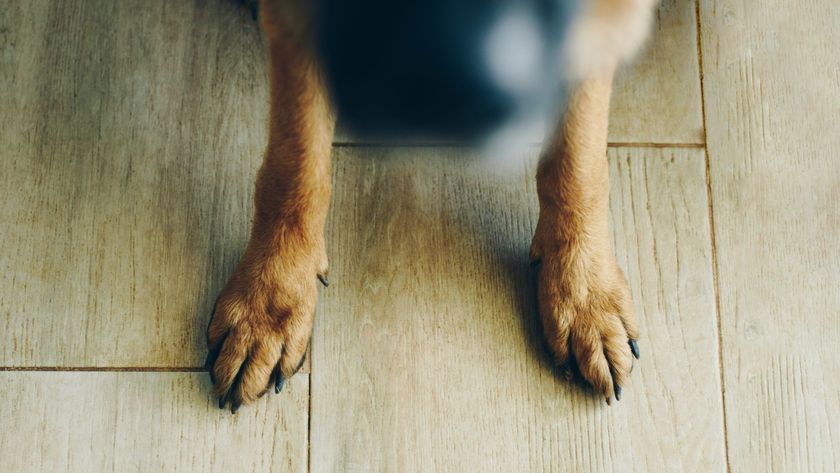Dog sprayed by skunk: Is it poisonous and how to get skunk smell off a dog
Is skunk spray dangerous, or just stinky? Learn more about how skunk spray can affect your dog

Having a dog sprayed by skunk spray ranks up there among the top annoyances for many dog owners, especially if you live in a rural area.
Skunks use their smelly spray to ward off predators and, in many cases, curious dogs are on the receiving end of this spray. In addition to the foul odor associated with skunk spray, many dog owners wonder whether this spray could have harmful effects on their pet. In order to fully understand the risks associated with skunk spray, it’s important to have an understanding of what is in skunk spray and how those components can affect dogs.
Is skunk spray poisonous to dogs?
Skunk spray isn’t just disgusting; it can have a number of harmful effects on your dog. The odor of skunk spray is attributed to thiols and other related chemicals, which are found in the spray. These thiols not only have a strong odor, they can also have harmful effects on humans and pets.
In most cases, dogs are sprayed when they are being nosy and investigating a skunk. Therefore, dogs tend to be sprayed around their face and head. This can allow skunk spray to enter your dog’s mouth and eyes, where it can cause far more problems than it would cause if only present on your dog’s skin.
Dogs that ingest small amounts of skunk spray may have signs that range from drooling to nausea or vomiting. Rarely, however, dogs that ingest large amounts of spray may have a more serious reaction.
Thiols present in skunk spray can react with red blood cells in the dog’s body, causing methemoglobinemia. This is a haemoglobin abnormality that interferes with the delivery of oxygen throughout the body. Affected dogs may develop pale or brown gums, lethargy, and weakness, with these signs developing hours to days after the initial skunk spray episode. Methemoglobinemia is a medical emergency.
If spray gets in your dog’s eyes, corneal damage may occur. Affected dogs may have red, swollen, or watery eyes, combined with a brief period of blindness. Rinse your dog’s eyes with lukewarm water for approximately 20 minutes, to flush the spray out of the eyes. If the eyes remain red, veterinary care may be needed.
Can a dog get rabies by being sprayed by a skunk?
Although skunks are common carriers of rabies virus, they cannot pass the virus in their spray. Simply being sprayed by a skunk cannot give your dog rabies. However, it is often difficult to determine whether your dog was sprayed from a distance or whether there was an up-close interaction that may have resulted in your dog receiving a bite from the offending skunk.
Unless you witnessed the interaction and are entirely confident that your dog was sprayed from a distance, you should contact your veterinarian if your pet has had any interaction with the skunk. Your veterinarian can help you determine whether your dog should receive a rabies vaccine booster.

Should you take your dog to the vet after being sprayed by a skunk?
Most dogs do not require veterinary care for skunk spray exposure. Skunk spray is not typically absorbed across the skin, so there is no toxicity risk from getting spray on the skin.
If you suspect that your dog ingested a large amount of spray, you should contact your veterinarian. Signs of ingestion may include vomiting, refusal to eat, pale or brown gums, lethargy, and/or weakness. If these signs occur, your veterinarian will perform a physical examination and blood tests to determine what treatment is needed.
If your dog has eye inflammation that does not resolve quickly after flushing the eyes, you should also seek veterinary attention. Skunk spray can damage the cornea of the eye and this damage could be permanent if left untreated. Your veterinarian can assess the integrity of your dog’s cornea and prescribe medication if needed.
Finally, your dog may need to see a veterinarian for a rabies vaccine booster, depending on the scenario in which the spraying occurred and your dog’s vaccination history.
How to get skunk smell off a dog
Eliminating the smell of skunk spray is a challenge! Bathing your dog in a typical dog shampoo will not help to remove the odor. Instead, you need to use a product or recipe that is specifically created to eliminate skunk odors.
If you live in an environment where your dog is likely to encounter skunks, you may wish to keep a bottle of skunk odor shampoo on hand. There are a number of available products that are intended for this use, including Nature’s Miracle Skunk Odor Remover and Skunk-Off Shampoo. These shampoos typically work best when used as soon as possible after your dog is sprayed.
If you do not have an appropriate shampoo on hand, there are several home recipes that have been recommended for skunk spray. Avoid recipes that feature tomato juice, and instead stick to this recipe, which is more effective:
Peroxide-Based Odor Remover
- Peroxide-Based Odor Remover
- 1 quart (4 cups) of 3% fresh hydrogen peroxide
- ¼ cup baking soda
- 1-2 teaspoons of liquid dishwashing detergent
It is essential that this shampoo is kept away from your pet’s eyes. Use this shampoo immediately after mixing, while the peroxide is still bubbling. This maximizes the likelihood of neutralizing the foul-smelling thiols in the skunk’s spray.
Lather your dog well with this solution and leave it in place for 5 minutes, then rinse your dog thoroughly. Be aware that the peroxide in this mixture may lighten your dog’s hair (especially in the case of dogs with a black or brown coat), but most people find that preferable to leaving their dog smelling like a skunk!

How to get skunk smell out of your house
In many cases, skunks spray when it’s dark outside. Your dog may run back indoors before you realize what happened. If that happens, you will need to wash any surfaces that your dog contacted, using the peroxide solution listed above or bleach. Either will effectively denature the thiols in skunk spray. For surfaces that may not hold up to peroxide or bleach, consider using vinegar; mix one part of vinegar with three parts of water, then use that solution to soak fabrics or wipe down surfaces. Vinegar is less effective than bleach or hydrogen peroxide, but it is also less likely to damage your fabrics.
To remove the skunk smell from the air in your home, open windows (if possible) to encourage ventilation. A small bowl of vinegar placed in each room may also help neutralize odors.
Conclusion: Know the risks
When dealing with a dog sprayed by skunk, your primary concern may be controlling the odor. In most cases, that is the only true problem that you will need to be prepared to address. However, in rare cases, dogs may develop serious illness or eye injury as a result of skunk spray. Be aware of these risks, so that you can recognize these complications early if they develop in your dog.
PetsRadar Newsletter
Get the best advice, tips and top tech for your beloved Pets
Dr. Barnette is a graduate of the University of Florida, where she received both her B.S. in Zoology and her Doctor of Veterinary Medicine (DVM). She has 15 years of clinical experience as a small animal veterinarian, treating dogs, cats, and occasional exotic patients. She now works as a freelance veterinary writer, creating educational content for veterinarians, veterinary team members, and dedicated pet owners. Dr. Barnette lives in southwest Florida with her husband and daughter (plus two cats, a dog, and a rescued dove!) and enjoys kayaking, biking, and hiking. Learn more about Dr. Barnette at www.linkedin.com/in/catherinebarnette.













